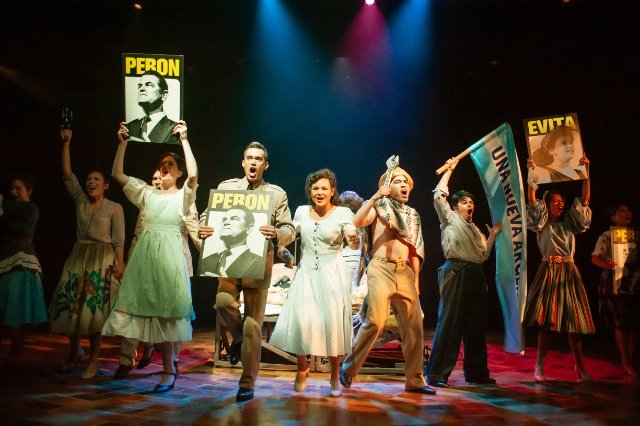Evita
Rags to Riches and Glamor Foreshortened
By: Victor Cordell - Jul 04, 2024
Despite human evolution and the requirement of a certain level of education, many people have shown themselves to lack the ability to exercise thoughtful judgment. Such is the playground of charismatics who manipulate their subjects into thoughtless minions. Eva Peron was such a personality, one whose devoted followers were captivated by her image.
Some revisionism influences the fine Bill English-directed San Francisco Playhouse production of “Evita” casting her in a more balanced light. Yet, the economic disaster of the Peron presidency; Eva’s complicity in the policies of the administration; and the long-range effects on the poor people of Argentina; and the country’s secular decline are a matter of record. On the other hand, so was her role in the passage of women’s suffrage and her diverting government funds to social programs of her liking.
Although the development of “Evita” had an odd history, the outcome was the first ever British-written musical to win the Tony Award for Best Musical, along with countless other honors and long runs in many venues. This is a quality musical with interesting characters, energy, emotion, and fine composition. In virtually all works for the stage involving music and lyrics, the composer of the music receives the lion’s share of the credit. In this case, that would be Andrew Lloyd Weber who initially rejected the project in order to work with playwright/lyricist Alan Ayckbourn on what would be the colossal failure “Jeeves.”
Lyricist Tim Rice was the driver of “Evita.” Curiously, he named his daughter Eva but he doesn’t appear to have liked the title character, a strange condition when one wants the audience to feel an emotional attachment to the material of the work. But whether by design or by happenstance, the audience does feel some sympathy for Eva Peron in the musical, if only because she overcame poverty; had the conviction to assert herself to become an indominable force in Argentina politics and social life; and died from cancer, no doubt with considerable pain, at the age of 33.
Sophia Alawi evinces emotion as Eva with a convincing, smiling charisma and some finely nuanced moments. At one point she descends a flight of stairs conveying both the satisfaction from the crowd’s adulation, yet telegraphing pain that foretells her diagnosis of cancer. Her internal conflict and transformation are also evident in the play’s powerful signature song “Don’t Cry For Me Argentina.”
Although an accomplished singer whose voice mellows in ballades and in lower range, some commenters note that Alawi’s voice seems strained or insufficiently melodious in the upper reaches. This should be considered in context. Eva’s life was riddled with stress and urgency, and her singing part was written accordingly. It is an exceedingly demanding role that hopefully Alawi will be able to perform several times a week. The great Patti LuPone originated Evita on Broadway, and she noted that the score must have been written by a man who hates women, as she is screaming throughout the performance.
That said, the score is full of melodic and memorable music. It mixes Latin dance music, rock, and pop to great effect.
The storyline is simple. Eva is depicted as an attractive, ambitious woman who sold her body, betrayed her first sponsor, and convinced the future president, Juan Peron, that “I’d Be Surprisingly Good For You.” There are jumps and gaps in the book, such as no indication that Eva and Juan actually got married.
But while Eva presents herself to the audience, a special conceit tells the other side of the story. A narrator and political activist, Che, stalks the scene throughout. The cynical Che argues the alternate reality that Eva represents only her own interest and that leadership is more than entertaining the peasants. He mocks her followers in the blistering “Oh, What A Circus,” a contrafactum of “Don’t Cry For Me Argentina” as they mourn her death in the opening scene.
The multitalented Alex Rodriquez lurks in the shadows and displays fine vocal skills as Che, also with critical, yet beautiful songs like “High Flying Adored.” This characterization is modelled on Che Guevara, who, though Argentinian, would have been too young during the time of the action.
Broadway veteran Peter Gregus effectively portrays a rather stoic Juan Peron overshadowed by his dynamic wife. The role is definitely third fiddle and limited in scope, but Gregus provides desired gravitas.
The production itself is quite striking. Set in a spare black box style with Heather Kenyon’s limited staging, low but active lighting by Michael Oesch plays a key role, and Abra Berman’s costumery offers visual impact and diversity. On the music side, Dave Dobrusky’s orchestra provides fine support for the singers from the dissonant opening “Requiem” by the chorus to the touching “Lament” by Eva at the end. Fine choreography by Nicole Helfer includes several sharply drawn tango pieces that are representative of Argentina.
“Evita” is a fine, crowd-pleasing choice for San Francisco Playhouse’s summer season. It should fare quite well.
“Evita” composed by Andrew Lloyd Weber, with book and lyrics by Tim Rice, is produced by San Francisco Playhouse and plays on its stage at 450 Post Street, San Francisco, CA through September 7, 2024.






